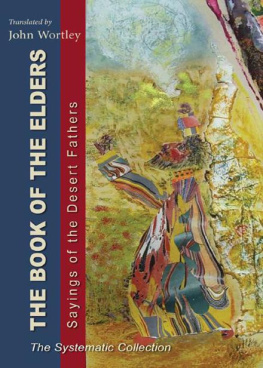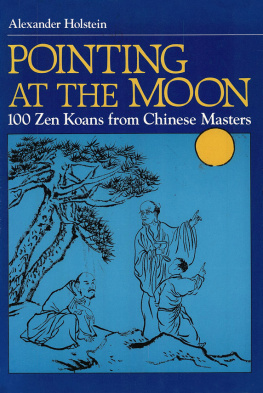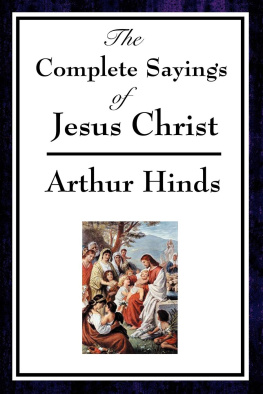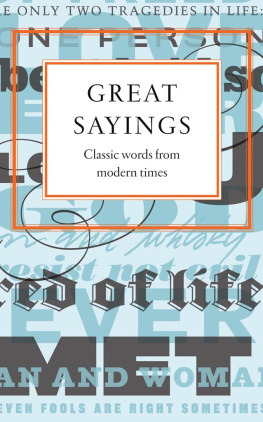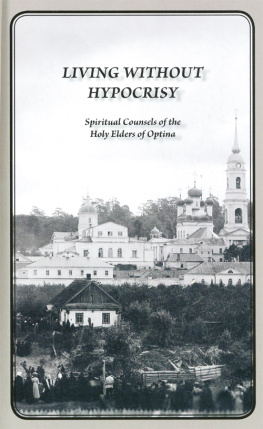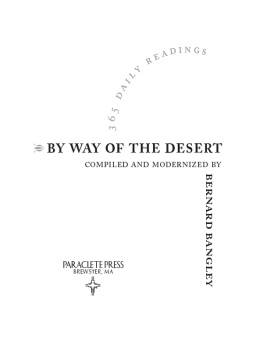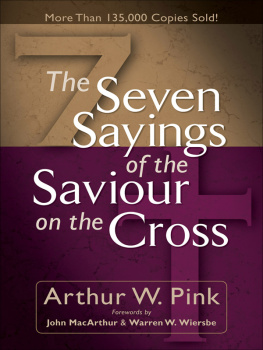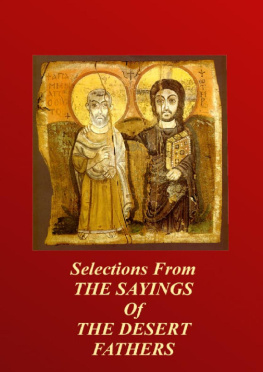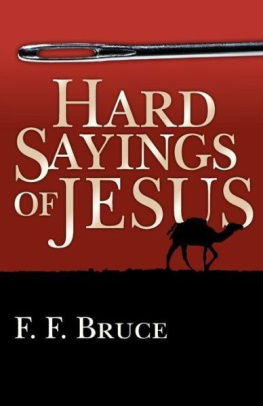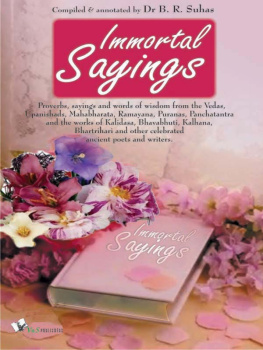All content available from the Liturgical Press website is protected by copyright and is owned or controlled by Liturgical Press.You may print or download to a local hard disk the e-book content for your personal and non-commercial use only equal to the number of copies purchased. Each reproduction must include the title and full copyright notice as it appears in the content.UNAUTHORIZED COPYING, REPRODUCTION, REPUBLISHING, UPLOADING, DOWNLOADING, DISTRIBUTION, POSTING, TRANSMITTING OR DUPLICATING ANY OF THE MATERIAL IS PROHIBITED.ISBN: 978-0-87907-770-9
CISTERCIAN STUDIES SERIES: NUMBER TWO HUNDRED FORTY
The Book of the Elders
Sayings of the Desert Fathers
The Systematic Collection
Translated by
John Wortley
Foreword by
Bernard Flusin

Cistercian Publications
www.cistercianpublications.org
LITURGICAL PRESS
Collegeville, Minnesota
www.litpress.org
A Cistercian Publications title published by Liturgical Press
Cistercian Publications
Editorial Offices
Abbey of Gethsemani
3642 Monks Road
Trappist, Kentucky 40051
www.cistercianpublications.org
All the quotations from Scripture in this book are presented in translation exactly as they are found in the Greek text of The Book of the Elders . Quotations from Psalms are identified by reference to the Septuagint numbering.
The punctuation used throughout this book is the publishers, not the translators.
2012 by Order of Saint Benedict, Collegeville, Minnesota. All rights reserved. No part of this book may be reproduced in any form, by print, microfilm, microfiche, mechanical recording, photocopying, translation, or by any other means, known or yet unknown, for any purpose except brief quotations in reviews, without the previous written permission of Liturgical Press, Saint Johns Abbey, PO Box 7500, Collegeville, Minnesota 56321-7500. Printed in the United States of America.
The Library of Congress has cataloged the printed edition as follows:
Library of Congress Cataloging-in-Publication Data
The Book of the Elders: sayings of the Desert Fathers: the systematic collection / translated by John Wortley; introduction by Bernard Flusin.
p. cm. (Cistercian studies series; no. 240) Includes index. ISBN 978-0-87907-201-8 ISBN 978-0-87907-770-9 (e-book) 1. Desert FathersQuotations. 2. Spiritual lifeChristianityQuotations, maxims, etc. 3. Monastic and religious lifeQuotations, maxims, etc. I. Wortley, John.
BR60.A62B66 2012
271.009'015dc23
2011051559
gratam in memoriam
Joseph Paramelle, s.j., 19252011
Contents
Bernard Flusin
Foreword
Writing in the 850s, the future patriarch Photios took note in his celebrated Bibliotheca of a collection of apophthegms very similar to the one John Wortley has translated here: This is a book especially useful to those who organise their lives with a view to their heavenly legacy. There is clarity in its style and moreover it is what a book ought to be that is in tune with people who are not thinking of exercising their talent but who have devoted all their effort and zeal to the doing of good works. Thus are specified both the nature of the collection (this is ascetic literature) and that which above all makes it attractive to the eyes of the modern reader: its clarity and the absence of rhetoric.
The Sayings of the Fathers is first and foremost an ascetic work assembled by monks primarily for their own use. It brings together the sayings of the fathers, meaning the great monks (the elders) who were responsible for training disciples living in the semianchoretic communities of Egypt in the fourth and fifth centuries of this era. So these very short texts, presented in large collections, are firmly rooted in a very precise milieu, and they ought to be read in the way they were originally intended to be received: each one as the charismatic utterance of a spiritual father, addressed to his familiar disciples or, on occasion, to visitors who came asking for a saying that would help them in their quest for salvation.
This is why the apophthegms make such an impression on us. The reader is directly confronted by the person of Antony or of Poemn with nobody in between, and the elder speaks to him as to a disciple, guiding him along the steep and narrow path of asceticism. And yet this is not the teaching of only one father or mother: numerous monks speak with many voices. The editors of the collection gathered up what they could find of the sayings of the fathers and mothers of old time and in this way tried to show that while in one way the elders proclaimed a single message, each person could doubtless find what was appropriate (even intended) for him in the diversity of the advice that was given.
The apophthegms are nothing other than what the elders said or the brief, edifying tales they told. It is in their simplicity that the sayings convey a sense of freshness and immediacy: it is Antony himself or Arsenius who is speaking to us or of whose life we catch a brief glimpse. Yet it is important not to lose sight of the fact that we are dealing with a literary work. A considerable space of time separates the monks of the apophthegms and the text that we read now. After the age of the great anchorites who inspired them to do so, more than a century went by before the refugee monks from Scete assembled their collections of sayingsin the Gaza region or elsewhere in Palestine. And there was a difference of language. Most of the Desert Fathers spoke Coptic, while the collections were written in Greek. Literary elaboration has played its part too; extracts from written works (e.g., of Evagrius or of Doulas) might be included under cover of a small collection of sayings. It is also possible to detect some variation in spiritual sensibilities lurking behind the apparent consensus of teaching when certain dossiers are subject to intense scrutiny. The apophthegms were essentially conceived to give the impression of direct contact between a disciple and his spiritual master. They are nothing other then the transformation of that contact into writing, and their greatest success (due to the exclusion of all rhetoric) is their ability to recapture the irreplaceable element in the saying that is heard and in the example that is seen.
The apophthegms are addressed, as Photios says, to those who organise their lives with a view to their heavenly legacy; hence, this is a literature of an essentially ascetic nature; or, to use the categories popularized by Evagrius at the end of the fourth century, it restricts itself to the praktika . So nothing is to be found in it of the theoria : no theology, no teaching on the difficulties arising from Scripture. Even though the apophthegmatic collections (in their original form) were put together at a time when the Eastern churches were being disturbed by serious christological dissensions, they are silent on this subject. This characteristic assured them of a wide distribution. First edited in Greek (the alphabetic/anonymous collection perhaps at the end of the fifth century, the systematic, translated here by John Wortley, probably at the beginning of the sixth), they were quickly diffused in Latin and Syriac. Then they were translated back into Coptic and, subsequently, into all the languages and confessions of medieval Christianity. In the Greek-speaking world they never ceased to be recopied, and from the second half of the sixth century they figured among the favorite readings of Eastern monks.
Lacking the protection of an authors name, the collections are defined by their function , which is to concentrate the teaching of the Fathers (insofar as this can be done). Hence, their contents are of many kinds and (especially in earlier times) always susceptible to modification and enrichment. This is why, although the collections are well known, they are still very badly edited. Their value for the history of monasticism or of spirituality became ever more clearly recognized in the course of the second half of the twentieth century when the fascinating and diversified world they bring back to life was more fully explored. But the immense effort they demand of the philologist has so far only very imperfectly been accomplished. Following in the footsteps of Wilhelm Bousset (1923), Jean-Claude Guy was able to unravel the manuscript tradition of the systematic collection (1962), and before his death he produced an edition of that collection, which Bernard Meunier was able to bring to completion.
Next page
